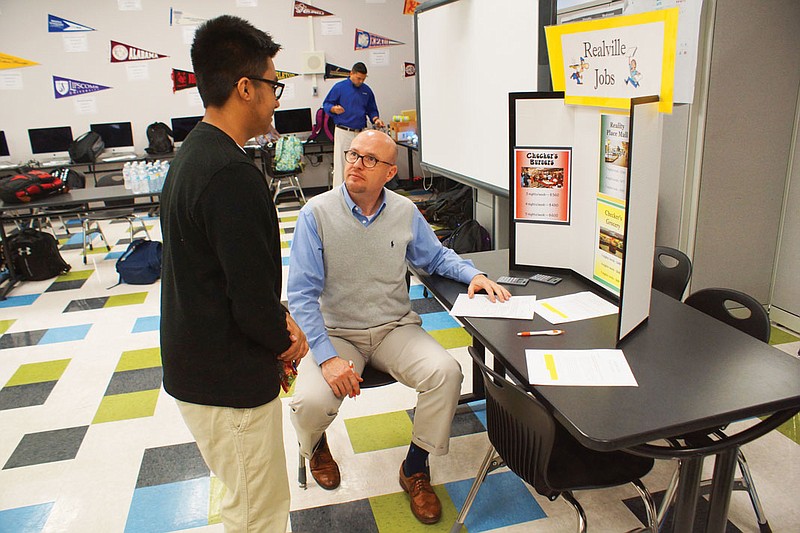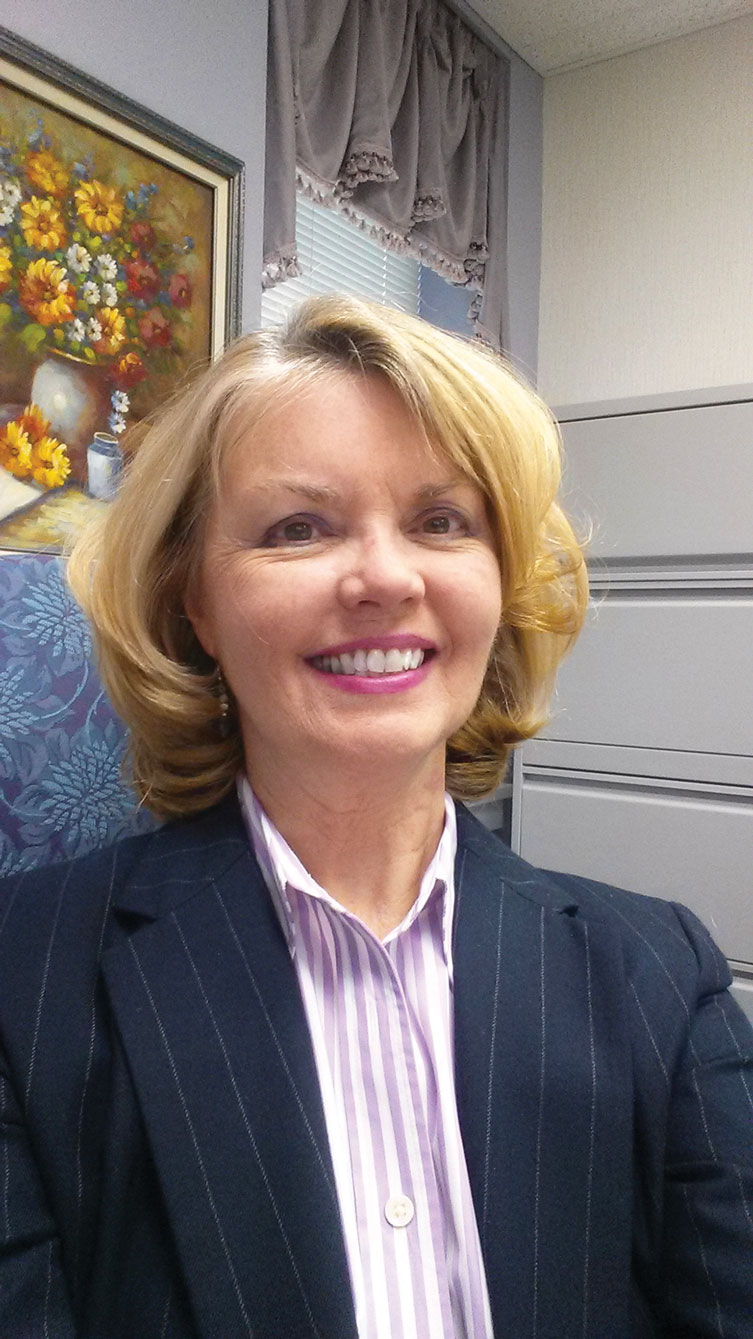The first time I volunteered for Reality Check, I was surprised by how seriously 9th graders took life in Realville USA.
"Well, I haven't visited the bank yet."
"I'll need to go back to school or I'll never cover all these expenses."
Want to get involved?
Contact Cathy Humble at chumble@chattanoogachamber.com or 423.763.4321. Special thanks to companies who give their employees’ time to our career readiness programs:› Aflac Insurance› BlueCross BlueShield of Tennessee› Caliber Home Loans› Chattanooga-Hamilton County Health Department› Chattanooga Zoo› Chattem› Cigna› EPB› Every Valley Leadership Academy› Jane of Trades Upscale Retail› Komatsu› Chattanooga Marriott› McKee Foods› Millennium Bank› Onyx Personnel Services› Regions Bank› Roadtec› Scenic Community Credit Union› Signal Centers› Synovus Bank› The Partnership for Families, Children and Adults› Unum› Vision Hospitality› WTCI-TV PBS* Partial list only, many other Chamber member companies support these programs. And special thanks to career readiness program sponsors: › Chattanooga State Community College› Hamilton County Department of Education › Tennessee Army National Guard› University of Tennessee at Chattanooga› UT Extension
"Wow, stuff is expensive."
Yeah, you're telling me, kid.
Reality Check is a real life simulation for high school first year students to think about what their lives will be like in nine to 10 years. They indicate the education level they think they'll attain, the kind of housing and car they want, how many children they might like, and more.
Now, if you have at least a few years of 'adulting' under your belt, one perk of volunteering for Reality Check is hearing firsthand the funny perspectives students have on what things cost, how much taxes are, etc. Remember when you wanted to be a fashion designer who lived in an 11-bedroom mansion?
After students think about their preferences, they're assigned a hypothetical career, family and income scenario. One student might be an electrical engineer who is single with a 4-year-old boy. Another might be a hairstylist with no children and a spouse who is also employed. Pretty much any family or career scenario you can imagine is a possibility.
Participants then visit 12 booths, staffed by volunteers, where they make decisions regarding typical expenses and what will fit their budgets. Stations range from Realville Automotive to Realville Utilities to That's Life – a booth that doles out unexpected events that will impact the budget (and we all know how enjoyable those are in the non-hypothetical world).
Great fun is had by all, but more importantly, students learn valuable life lessons about money, education and careers. They reported based on the 2016-17 school year that:
» 98 percent better understand how education affects future salary
» 90 percent will wait to have children until they can afford them
» 77 percent learned about payroll deductions
» 90 percent better understand their parents' concerns about money
Reality Check is one of six career readiness programs the Chattanooga Chamber brings to more than 16,500 students in nearly every Hamilton County public school each year.
They're delivered by more than 1,100 volunteers with varied professional backgrounds from more than 200 companies.
These volunteers use their life and work experience to engage our future workforce with programs spanning grades six to 12:
College Day Out
In this program, sixth graders from inner city and rural schools visit Bryan College, Chattanooga State Community College, the Tennessee College of Applied Technology or the University of Tennessee at Chattanooga. In five years, more than 6,000 students have experienced a real-life half-day college experience and campus tour through College Day Out. This year's focus will be on Opportunity Zone middle schools: Dalewood, Orchard Knob and East Lake.
Career Crunch
This two-day career awareness fair for eighth graders engages local professionals to teach students about the educational requirements for in-demand jobs, encouraging good choices.
Reality Check
Ninth graders learn about budgeting and the connection between education level and income with Reality Check. Students roleplay as heads of household providing for their hypothetical families.
Get a Job
Interviewing skills, job applications and dressing for success are among the topics this program covers with 10th graders to prepare them for the workforce.
Who Wants To Be a Millionaire
A money management program for 11th graders, Who Wants To Be a Millionaire focuses on saving, financial planning, credit card management and other financial literacy topics.
College & Career Fair
Junior and senior high school students network with college representatives and members of our business community at the College & Career Fair, staffed by volunteer vendors who set up booths to share information about higher education and career opportunities.
Meet a Volunteer
June Puett, Extension Agent at University of Tennessee Extension, helped develop several of the Chamber's career readiness programs and is a committed volunteer. Here she tells us more about her experiences helping deliver these to students.
When have students made you laugh during your work with these programs?
Puett: As part of the Who Wants to Be a Millionaire program, we ask students to hold a baby doll as we explain it costs $245,000 to raise a child. The students' reactions range from cradling the baby as if it were real to goofing off. Both reactions result in a lot of laughter. Either way, they have realizations about waiting to have children until they earn a good salary, as well as the importance of staying out of debt so they can save and invest at an early age.
In our scenario, they stop investing $200 per month in their retirement account due to the expense of parenting. Luckily, they've hypothetically contributed to that account for 10 years and allowed the money to accumulate, so they'll earn $600,000 at retirement age due to compounded interest. But they could have earned thousands more if they'd kept contributing.
It's estimated that millennials will need $2 million to maintain a comfortable retirement lifestyle. We inform students that many employers no longer offer pension plans, so it will be up to them to develop good money skills and discipline with everyday spending habits.
We start this program by asking who wants to be a millionaire, and we laugh when every hand in the room goes up. Money doesn't buy happiness, but we focus on how having enough money to pay bills makes life less stressful.
How did you get involved as a volunteer for our career readiness programs?
Puett: In 2002, I invited the Chamber to participate in the Tennessee Saves financial literacy program. We realized our goals were similar and that was the basis of a 15-year partnership. I bring my background in education and experience in program development and volunteer management, while the Chamber provides a network of professionals and resources.
I chaired the Reality Check initiative and developed the Who Wants to Be a Millionaire program.
We introduced Millionaire before personal finance courses became a requirement for high school graduation in Tennessee. Today it enhances what students learn in the classroom. They appreciate the business community taking time to visit and share real world experiences.
I love watching their expressions when they learn how much credit can cost them and how much money saving for a down payment can save them over time.
Teachers and counselors often share their own experiences. They say if they had participated in a program like Millionaire in high school, they would have made better choices about money.
How do you feel our work with these career readiness programs makes a difference?
Puett: We measure impact through immediate feedback and surveys. It's rewarding to read the comments. An East Ridge student said he'd been spending all his income from two jobs on two trucks. The Millionaire program motivated him to sell one of his vehicles and save $400 a month.
Students also report small spending changes, such as eating at home instead of out and reducing the number of soft drinks they consume.
The Millionaire program discusses the economic impact of smoking, and last year, 82 percent of those surveyed said they'd reduced or stopped the use of tobacco products or didn't start in the first place.

